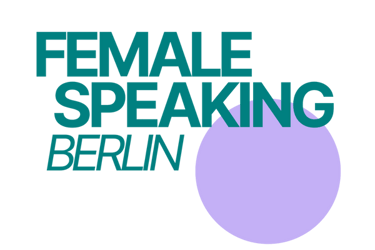Frequently asked questions
What do you mean when you use the terms 'women' or 'female' or 'womxn'?
With all three terms we refer to all persons who identify as female. This includes diverse experiences of womanhood, encompassing trans, cis, and intersex women. Additionally, non-binary identities and diverse expressions of gender and desire are explicitly included in our understanding.
Why are your trainings designed for women* only?
When we hosted our first workshop for women only (still considering in that moment if that is a format that would work) - we got the answer immediately.
Something shifts when you put women together in a room, when you create a safe and open space. Women get the chance to connect on another level, they speak the same language - having shared experiences. This creates a natural system of support and community. We want to empower women, because we believe that as long as there is no gender equity - we are losing 50 percent of the potential and perspectives that women can bring to the table: on how we shape our society, our politics, our workplaces and our values.
We feel it is our mission to contribute to the empowerment of women. By bringing our skills to the table: public speaking.
Don't you think we should include men as well, when we want to create a more equal world?
Absolutely. Creating gender equality requires everyone at the table—not just as passive participants, but as engaged allies. At that table, we should be having conversations, create awareness and equip people with the skills to recognize and challenge bias.
At the same time, we recognize that many women lack supportive spaces where they can grow, practice and build confidence in speaking up. Creating women-only workshops and spaces, foster connection, solidarity, and empowerment, which is why we believe in the power of women supporting women.
That said, we are actively working on allyship programs to include men in this conversation in an impactful way. Stay tuned!
How does public speaking contribute to female empowerment?
To answer this question, it’s important to define what being empowered means. We look at it as having the confidence to stand up for oneself, pursue goals and act with strength and independence.
When women are equipped with the right skills and support, they can step onto the stage with confidence, increase their visibility and inspire other women to do the same. Their ideas, perspectives and voices are essential in shaping a more equal world! Strong communication skills enable women to step into leadership roles, advocate for themselves and share their expertise, especially in male-dominated spaces.
Research shows that women are interrupted more frequently in meetings, making it even more crucial to develop the ability to speak up, handle interruptions and own the room.
"Even at the highest levels of organizations, many otherwise dynamic women struggle in meetings. Some say their voices are drowned out; others can’t find a way into the conversation at all."
(source: "Women Find Your Voice" by Kathryn Heath, Jill Flynn and Mary Davis Holt; Harvard Business Review; June 2014 issue)
Most importantly, what we see happening in our trainings, is that when women share their stories and experiences, they naturally create strong networks of support and mentorship. This starts a movement that contributes to female empowerment & with that, to gender equality.
What kinds of services do you offer?
We offer public speaking training programs, workshops, and 1:1 coaching. These range from short intensives to multi-session programs, depending on your goals.
Do I need prior public speaking experience?
Not at all. We work with complete beginners as well as experienced speakers who want to refine their presence, structure, or confidence.
Are your programs held in English or German?
Most of our programs are offered in English. Selected workshops or coaching sessions may also be available in German and Dutch.
Are your programs only for Berlin-based women?
Our open, in-person workshops take place in Berlin. All our customized training programs and workshops are bookable worldwide.
How can I stay informed about upcoming events?
You can sign up for our newsletter or follow us on social media for updates on new workshops, programs, and events.
Public speaking training, workshops, and coaching for women
© 2024. All rights reserved.
hello@femalespeakingberlin.com
+49 176 654 256 35
Connect with us on Linkedin
Impressum
Terms & Conditions
